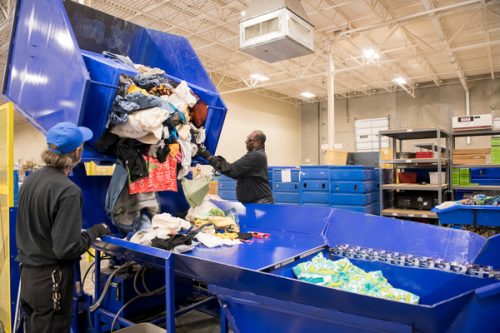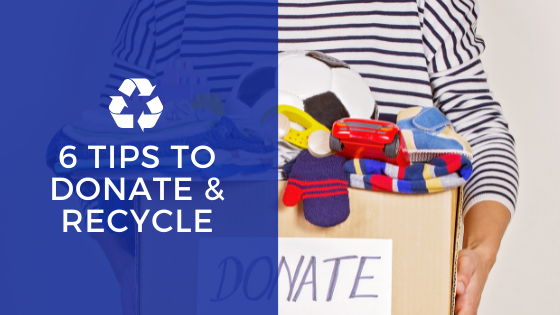
Six Tips to Donate and Recycle
May 2, 2022The annual celebration of Earth Day last month serves as a great reminder to “go green” and support a sustainable future for our planet by reusing, recycling and donating your clothing and household items. Below are some tips to consider when selecting and preparing your items for donation.
 1 – Gather and separate your donations according to Goodwill guidelines.
1 – Gather and separate your donations according to Goodwill guidelines.
It’s a great time to do some spring cleaning! If you’re cleaning out your closets, emptying storage units or decluttering your garage, it’s always a good idea to gather all of your potential donations into one spot.
Instead of packing all the items you plan to donate into a single bag or box, we recommend separating them by type – for example, making piles for items such as books, clothing, electronics, housewares, kitchenware and large, bulky items. It is usually best to separate soft items like clothing from other breakable items, like dishes. This will make the sorting process easier for the donation center attendants and prevent accidental damage.
 2 – Pre-inspect your donations.
2 – Pre-inspect your donations.
Be sure to inspect all items you are considering donating to ensure there are no missing, damaged or broken parts. Also be sure to test electronics and appliances to see if they are in good working order. When donating board games, toys or puzzles, make sure to include all parts and pieces. Then, secure the boxes with a rubber band or tape to prevent losing small pieces in transport. This way you can be sure all your donations make a difference.
 3 – Create a list of your donations and evaluate worth.
3 – Create a list of your donations and evaluate worth.
It’s a good idea to take the time to do this as it can be very useful later on if you plan to use these donations as a write-off for tax purposes. Write down all the items you are planning to donate, then use the Goodwill Valuation Guide to estimate the worth of your total donation.
After dropping off your donation, ask the attendant helping you for a receipt for your contribution. Keep your receipt until it’s time to file your taxes, then file the information in the appropriate section for charitable deductions.
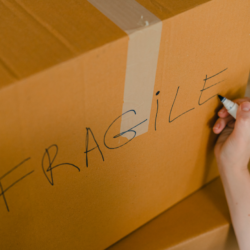 4 – Label fragile items.
4 – Label fragile items.
If you are donating something that has delicate parts or could potentially break, such as dishes, porcelain figurines, jewelry or mirrors, make sure you package them carefully to avoid breakage. Use newspaper or bubble wrap to cushion these types of donations and make sure you clearly label any boxes containing breakable items as “fragile.”
Not only will a broken item lose most, if not all its value, but they can also be a safety hazard for those handling the donations. Be sure your fragile items are safely packaged.
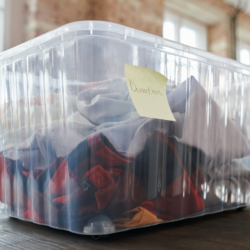 5 – Load your donations into a reusable container.
5 – Load your donations into a reusable container.
Plastic totes or containers are often more durable than plastic bags or cardboard boxes, which can be helpful when moving heavy or large donations. Additionally, by transporting your things to a donation center in a reusable container, you are helping protect the environment by reducing waste.
6 – E-Recycle.
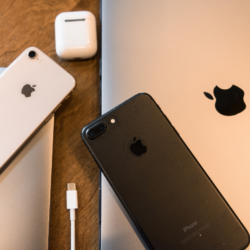
Goodwill also has E-Recycle stores in Richmond and Hampton that carry a variety of electronic devices that go through a multi-step data cleaning and refurbishment process before making it to the sales floor. For items that cannot be refurbished, Goodwill has a nationwide partnership with Dell Inc. to safely break down the devices, protecting the environment from potentially harmful metals and chemicals.
Please keep in mind that Goodwill accepts most new, like new and gently-used household items, including furniture and electronics. However, some common items that we do not accept include:
- Carpet/carpet padding
- Chemical products
- Cribs
- CRT, DLP or rear-projection TVs
- Large appliances (refrigerators, washers/dryers, etc.)
- Mattresses/box springs
- Weapons
A list of items Goodwill does not accept due to safety concerns can be found here: https://goodwillvirginia.org/donate/personal-donations/what-cant-i-donate/.
And one final note, in addition to making donations, you can also “go green” by shopping at Goodwill for items such as furniture, electronics, home décor and more. This helps keep items out of landfills and provides revenue used towards creating local employment and job training opportunities, which in turn helps support sustainable communities.
To learn more about Goodwill of Central and Coastal Virginia and its sustainability efforts, please visit https://goodwillvirginia.org/about/working-at-goodwill/.







